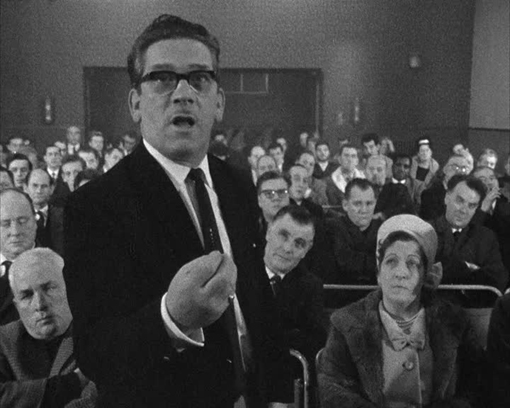Visions of Change – The Evolution of the British TV Documentary
A traditional industry of a different kind that had developed in the Midlands was the subject of Dispute: Round One and Two – fifty-minute documentaries (tx. on 27 April and 4 May 1967) portraying two related disputes in a Coventry car-carrying firm, and the battles between management (personified by Mr Port) and the union (personified by Mr Lapworth) over redundancies. Perhaps it was in recognition of the complexities of industrial relations that the BBC deployed considerable resources by sending out three separate film units – helmed by Jack Gold, Ken Ashton and Paul Watson – to capture what was unfolding in Coventry. As the commentary takes pains to point out, nothing was staged or rehearsed in this early precursor of the ‘fly on the wall’ documentary. Eye on Research: Test Flight (tx. 12 May 1959) – devoted to the test flight of the supersonic aircraft Fairy Delta II – is both the sole representative of the science documentary and ostensibly the only programme to have been broadcast live. In fact, due to the technical difficulties of flight and the important of daylight, this documentary was shot in advance, early on the morning of the day of transmission, using a new portable Ampex video recorder. Nevertheless it retains all the sense of immediacy and urgency of live transmission, anchored by the convivial Raymond Baxter.

‘Dispute’ (Image: BBC/BFI)
Finally, the more modish and visually dynamic ‘end’ of the documentary spectrum is represented through two films by directors who went on to illustrious feature film careers – John Schlesinger and Ken Russell. Schlesinger’s Song of the Valley, a short for the BBC arts series Monitor (tx. 1 November 1957), is set to Dorothy Squire’s eponymous song and dramatizes the lyrics by intercutting between industrial Halifax and a handcuffed ex-con who is seemingly being escorted to prison by train. Perhaps the best-known documentary in this collection, Russell’s Pop Goes the Easel – also made for Monitor (tx. 25 March 1962) – is brilliant both as a document of Swinging London and as a televisual example of pop art.
I’d like to conclude by noting that, although it does not feature any contributions from (the admittedly few) women working as filmmakers at this time, the towering figure of the BBC’s Grace Wyndham Goldie (Bel Rowley in The Hour) looms large over Visions of Change. It was Wyndham Goldie who commissioned and championed the early work of Denis Mitchell and Philip Donnellan; who suggested to Dennis Potter that he spend time shadowing Mitchell during 1959; and who was pivotal in the launching the influential Monitor series.
Dr Ieuan Franklin
Visions of Change – The Evolution of the British TV Documentary, Volume 1 BBC 1951-1967 GB. DVD, BFI. 382 minutes. Price £34.99

 Learning on Screen
Learning on Screen